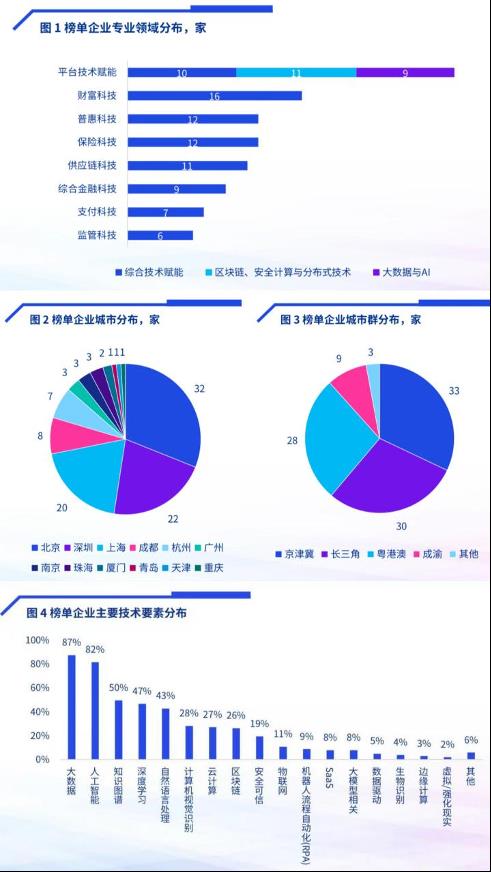KPMG China Financial Technology 50 List: Beijing, Shenzhen and Shanghai rank in the top three, and 70% of the listed companies have more than 40% technical talents.
Image source: the idea of the worm
Zhu Hanqi, intern reporter of Economic Observer Network On January 9th, KPMG China released the "2023 KPMG China Financial Technology Enterprises Double 50 List" and the annual trend report.
Huang Aizhou, managing partner of KPMG China Financial Technology, said that in the process of digital transformation of the financial industry, there are unique advantages in the three pillars needed for the vertical model of the industry: algorithm, computing power and data. The financial industry has mastered a large number of historical data and written materials, which provides natural convenience for the development of the industry model; In the process of financial digitalization and intelligence, financial technology enterprises have also formed unique solutions in terms of algorithms and computing power.
The report analyzes the listed enterprises in five dimensions: professional field, city and region, main technical elements, proportion of technical personnel and establishment time.
In the distribution of professional fields, platform technology empowerment and wealth technology rank first and second, Pratt & Whitney technology and insurance technology rank third, and AI and blockchain are still the core technologies in the underlying technologies.
In terms of urban and geographical distribution, Beijing, Shenzhen and Shanghai rank in the top three, and Chengdu ranks fourth for the first time. Tan Wei, chief partner of KPMG in China, Sichuan and Chongqing, said that in recent years, Chengdu has incorporated financial technology into the category of "building a circle and strengthening a chain" and become one of the 28 key industrial chains, forming an ecological layout that integrates Chongqing, links the whole country and sails the whole world.
In the distribution of main technical elements, the types of technical elements are more colorful, and the proportion of technical elements such as safety, credibility and large-scale correlation is obviously improved.
In terms of the proportion of technical personnel, 70% of the listed companies have more than 40% technical personnel, thus occupying an advantageous position in the fierce market competition.
In terms of the time distribution of enterprise establishment, the proportion of listed enterprises established for more than 10 years in 2023 has increased, and more enterprises that have been deeply involved in this field for a long time have continuously consolidated their market position by optimizing data processing, increasing transaction rate, simplifying financial service processes, and innovating financial products and services.

In addition, the report also puts forward nine major trends:
Trend 1: The development of financial macro-model will have a far-reaching impact on the paradigm of financial technology industry (annual trend). In the era of mobile internet, domestic manufacturers are actively developing the layout of financial big models, and relevant enterprises need to build competitive advantages by virtue of "having data" and "understanding scenarios". In the future, the wide application of financial macro-model will have the following changes: the change of AI cognition and concept, reshaping customer service process and experience, improving risk management, improving financial service efficiency and innovating financial business forms.
Trend 2: Science and technology investment pays more attention to output energy efficiency, and peer-to-peer science and technology output changes to ecological empowerment mode (integrated financial technology). Comprehensive financial technology enterprises pay more attention to business orientation and precise focus in objectives and methods, and change from technical empowerment to all-round ecological empowerment in service direction.
Trend 3: AI helps to innovate wealth management, and the core system of the organization is autonomous and accelerated (wealth technology). Wealth technology enterprises provide support for wealth management business scenarios such as investment, research and marketing, and will explore more application scenarios of large models to improve efficiency and service upgrade.
Trend 4: Insurance technology has evolved into risk reduction management, and the service boundary (insurance technology) has been continuously expanded in combination with industrial upgrading. Insurance technology companies turn the original uninsurable risks into insurable risks, and penetrate technology into the development process of all walks of life, which leads to new risk management demands.
Trend 5: Digital symbiosis and digital platform services accelerate the development of inclusive finance (Pratt & Whitney Technology).
Small and medium-sized enterprises access digital resources through the digital service platform, build a digital intelligent business process, meet the rapidly changing market demand, and accelerate the digital intelligent transformation of small and medium-sized enterprises.
Trend 6: Multi-parties join hands to expand the new blue ocean of supply chain finance, and scene product innovation is emerging (supply chain technology). The supply chain science and technology platform has accelerated its efforts in the scene business. It is expected that there will be more scene-based innovative products based on data credit in the future, and the traditional confirmation mode will begin to weaken.
Trend 7: Mobile payment innovation scenario application, cross-border payment opens up a new chapter in the sea (payment technology). The third-party payment platform at the C end expands its business by exploring new scenes and product innovation, and the mobile payment platform at the B end provides integrated services based on payment functions. The cross-border payment platform will also provide customers with integrated services to enhance customer stickiness.
Trend 8: Regulatory technology is expected to improve regulatory efficiency with the help of large models (regulatory technology). The development of regulatory technology will rely more and more on scientific and technological means to achieve more efficient and accurate supervision.
Trend 9: A new round of development opportunities will be opened, and a big article on digital finance (platform technology empowerment) will be done with the tide. At the present stage, the trends of innovation and going out to sea are highly certain, and the actions of "data elements ×" and "high-quality development of computing infrastructure" are steadily advanced, and the opportunity of technological change is expected to drive the sustained release of China’s financial technology value.